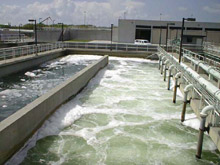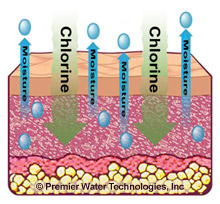Chlorine in Drinking Water

In fact, the US has been using this cheap and effective germicide since 1908.
While it’s effective, chlorine disinfection has its downsides. Chlorine and the “chemical soup” it creates may damage your home.
Even worse, it may have a negative impact on your health.
About Chlorine in Drinking Water
Water treatment plants use chlorination in several steps. Pre-chlorination is used to oxidize metals like Arsenic, Iron, and Manganese so they can be removed with Filter Systems.
Cities use chlorine as a safeguard against bacteria. And it works too – waterborne disease has been nearly eliminated. Virtually all living organisms are killed when chlorine is added to drinking water.
Chlorination destroys microorganisms by:
- Damaging cell membranes
- Inhibiting specific enzymes
- Destroying nucleic acids and mechanisms
After the initial disinfection and filtration, a final dose of Chlorine is added to water before its stored in towers and reservoirs.
Chlorine Damage to Your Home
Chlorine has several negative effects on your home. Its a strong oxidant that quickly destroys plastic and rubber components.
Water Softeners
Water Softener Resin Beads are vital to removing hard water. Chlorine breaks down the chemical bond of resin, and turns these hard plastic beads into a gel-like mush.
Appliances and Plumbing Fixtures
Rubber seals and gaskets in appliances and plumbing fixtures suffer from chlorine in water too. Oxidized rubber is mushy. It can’t create a good seal. Many people have experienced a leaky toilet or faucet. This is often caused by chlorine.
Copper Plumbing
Virginia Tech research has found a direct link between Chlorine and Copper plumbing corrosion. Chloramines,a combination of Chlorine + Ammonia, have also been found to increase corrosion.

Chlorine and Health Risks?
Alot has been written about the dangers of chlorine in water. That it’s a health risk. This is not totally accurate.
So what effect does chlorine have on the body?
Dry Skin and Premature Aging
New York Department of Health reports that chlorine in water will strip natural oils from skin. Causing it to dry out and crack.
This leads to wrinkles and premature aging.
So Chlorine does have some issues. But the real problems are caused by the chemical reactions it causes.
Disinfection Byproducts – the Ugly Side of Chlorine
Chlorine reacts with organic compounds like fulvic and humic acids to form a toxic soup called Disinfection Byproducts (DBP’s). Over 600 DBP’s have been identified including:
- Trihalomethanes
- Halocatic Acids
- Trichloroacetic Acids
This is important:
Disinfection Byproducts are measured in parts-per-billion (ppb).
The legal limit for Disinfection Byproducts is a fraction of Chlorine.
The legal limit for most DBP’s range from 60-80ppb. But the EPA Maximum Contaminant Level Goal (amount shown to have no health risk) is ALWAYS ZERO.
Trihalomethanes and Haloacetic Acids have been linked to:
- 21% increase in bladder cancer – 1992 Medical College of Milwaukee, WI
- 38% increase in rectal cancer – 1992 Medical College of Milwaukee, WI
- 5x higher risk of developing asthma – 2008 Catholic University of Louvain, Brussels, Belgium
- 9.5-16% increased risk of miscarriage – 1998 California Department of Health Study
How to Remove Chlorine and Disinfection Byproducts
Water Filters that use Carbon Filter Media are the best solution to remove Chlorine and its byproducts.
Drinking Water Filters are a good start. “Water Purifiers” like Reverse Osmosis use Carbon as part of their process.
The BEST solution is a Point of Entry (POE), or Whole House Carbon Filter.
You absorb such high levels of Chlorine and Disinfection Byproducts through your skin. Why not give your home and family additional protection?
Shower filters SHOULD NOT contain carbon. Hot water open up the pores in Carbon, and release all the trapped contaminants.
Most shower filters use KDF filter media which reduces Chlorine into Chloride.
Contact Time is critical for Carbon to work. Carbon will adsorb more chemicals from water if it flows SLOWLY through a filter.
Generally speaking, the bigger the filter, the better the filtration.
Do You Have a Chlorine Problem?
Premier Water has the filtration experience you can trust.
We can help you improve your drinking water quality, protect your home, or improve your business process.
Call us at (952) 479-4553 or contact us for a FREE Water Test. We’ll analyze your Chlorine levels and other water chemistry that may affect Chlorine removal.
